July 3, 2019 issue
Cricket
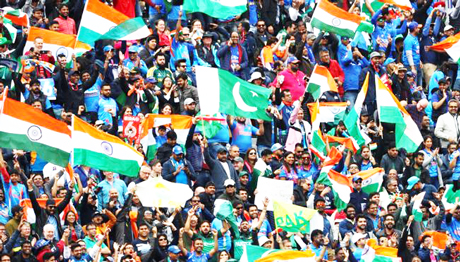
By Manish Pandey
"It's so embedded in the culture. The atmosphere that's created when an India game is on, it just adds to the emotional connection. That's really why I support India ahead of England."
Pavan Patel, 21, is English-born and bred but during England's Cricket World Cup match against India on Sunday, he rooted for India.
This cultural clash is not an uncommon thing to hear.
Cricket fans born and brought up in England, with family ties to another country, often choose to support their familial country over England.
In 1990, Lord Norman Tebbit, a politician from the Conservative party, controversially suggested that Asian immigrants and their children had not truly integrated into Britain until they supported the England cricket team ahead of their country of origin.
According to the International Cricket Council, over 80% of World Cup tickets have been bought by people who live in England, but less than half by people who actually support the England team.
So what are the reasons behind this?
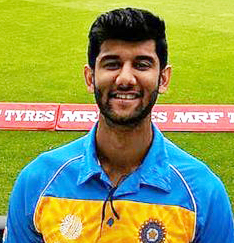
'It's a cultural connection'
"It really helps me feel in touch with my Indian roots. It's one of those things you're raised into," Pavan tells Radio 1 Newsbeat.
For many young British Asians, family and cricket go hand in hand.
"From a young age I've always just seen Indian cricket on TV. So the whole family get together and watch India's game. It's an electric buzz."
Pavan says the attachment he feels to the Indian team is because of a "similar culture and background".
"So growing up it's a cultural connection that I just didn't share with the England team."
'I just don't fit in here'
For 28-year-old Pakistan fan Annie Hayat, more diversity in the England team when she was growing up would have made all the difference.
"I would've felt more related and connected to the English team than I currently do.
"When I was growing up, I didn't get to see much of that [Asian people] in the team. You felt like 'I just don't fit in here' so you just steer towards the Pakistan team."
With the likes of Moeen Ali and Adil Rashid playing regularly, Annie does recognise that Asians are now "represented a bit more" in the England team.
But it's not just about ethnic representation.
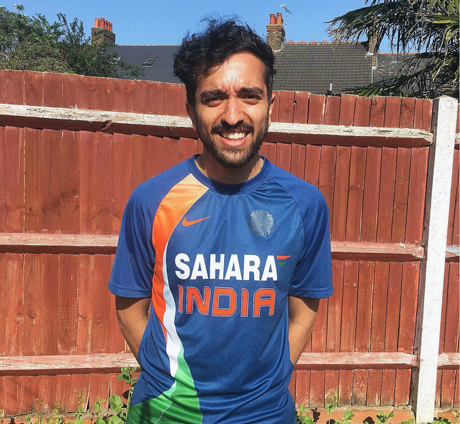
supporting a team
A story of 'rags to riches'
Cricket in England is seen as a sport for the 'elite' - with 43% of men playing international cricket for England going to private school, according to a report by the Sutton Trust and Social Mobility Commission.
"With the English players, I've not heard of many working-class stories, it's more of a selective group that I can't identify with," says 23-year-old Sagar Ghelani, an English-born India fan.
"But for Indian cricketers, I've heard the stories of rags to riches, where they've come up in poverty and had to toil."
Sagar finds the stories of Indian cricket stars like Sachin Tendulkar and MS Dhoni "inspiring".
Dhoni was a ticket collector for the Indian railways and has gone on to captain India to multiple trophies, becoming a worldwide icon along the way.
"They really followed their passion, their dream and became cricketers. I can feel that," Sagar adds.
The hate crime effect:
For many older immigrants, facing racism and discrimination when they first arrived in England was a big reason for not supporting the team.
But is that the case for the next generation?
Not for 23-year-old Sia Najumi, who is an Afghanistan fan.
"I wouldn't say my support stems from the consequences of hate crime. It's my parents' country and I'm proud they've qualified, which is why I support them."
Sia does say however that the reported rise in hate crime in the last five years has "driven" her closer to her Afghan culture and community - including the team.
"It does feel like there's this invisible wall and an ongoing division between my culture and the English community."
The latest statistics from the government show the number of hate crimes recorded by the police has increased by 123% since 2012/13, with 94,098 offences in 2017/18.
Pavan says that while hate crime hasn't affected his support, "the current political atmosphere is probably not going to encourage" the future generation of British Asians to support England.
So going back to Lord Tebbit's test, does not supporting England in cricket mean you're not integrated? Not according to Sagar.
"It's an easy link to make between supporting a team and not being a proper part of the country."
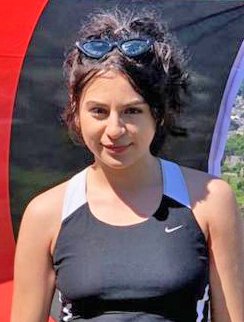
Sagar says he considers himself English, supports them in football and loves the NHS.
But he supports the Indian cricket team because they "connect" with him in a way the English team doesn't.
"Supporting a team doesn't necessarily reflect what your view of a particular country is."
Is cricket a special case?
Many of those who support Asian teams like India and Pakistan in cricket, support England in every other sport they follow.
A survey by ComRes and BBC Asian Network found 77.19% of British Asians born in the UK support the home nations in international football tournaments.
According to Pavan, supporting a team in any sport is about feeling a "relatable" connection to them.
"Growing up here, you're just surrounded by football and everyone supporting England. That whole environment fed through to me."
A greater diversity of backgrounds in football has also "made a huge impact".
"You see people from every background which reflects the entire country. Someone like Raheem Sterling, I've heard about his background and struggles.
"So I think you see yourself more in the England football team than the cricket team."
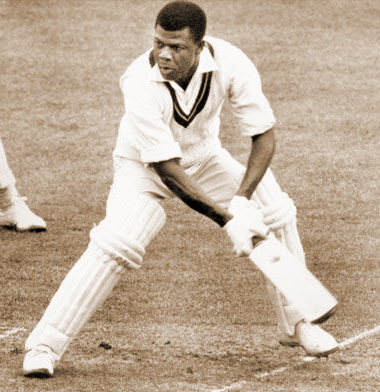
By Romeo Kaseram
Seymour Nurse was born on November 10, 1933, at Jack-My-Nanny Gap in the parish of Saint Michael, Barbados. His father was a carpenter, and Nurse was the youngest of five children, with two brothers and two sisters. His aptitude for the field was recognised early at St Stephen’s Boys School in football and cricket. He was severely injured on the leg during a football game, which put an end to its pursuit as a career option. According to Wikipedia, severe advice from his father following the football injury was instrumental in Nurse choosing the bat, the elder Nurse reportedly advising his son to “stay in cricket and quit football, otherwise you are on your own; football in Barbados is too rough.”
Wikipedia also reports Nurse being impatient to enter the working world, which he did when he was 16 years old, the decision to forego advancing his schooling a later regret. Noting Nurse performed well academically, Wisden comments on this early, teenage impatience, linking the decision to forego schooling to an “impetuosity” he would later exhibit on the cricket field.
Wikipedia tells us along with other Barbadian cricketers who originated from humble circumstances, Nurse’s cricket career started in the Barbados Cricket League. A young and promising right-hander, he played in the Bay Street Boys’ Club, which also nurtured the youthful Garfield Sobers and Conrad Hunte. Nurse’s talent did not go unnoticed, and he progressed to the elite Barbados Cricket Association competition, later joining the Empire Cricket Club. Here he met Everton Weekes, who became a mentor, and a major influence during Nurse’s career. As Wisden notes, Nurse says Weekes made “him into a first-class cricketer, a batsman able to get a line on the ball to know precisely where to hit it”.
Nurse made his first-class debut against Jamaica at Melbourne Oval in Kingston, Jamaica in July 1958 at age 25. Playing for Barbados, he scored 21 in the first innings, which was followed with a top score of 35 in the second innings, with Barbados all out for 90. He scored his maiden first-class century, 128 not out, later that month in the second match against Jamaica at Sabina.
His entry into big league cricket came in 1959. According to Wisden, “In December… after only four first-class games, he faced MCC, and with a score of 213 in six and a quarter hours played a big part in the defeat of the touring team in their first major encounter.” As Wisden wrote then, Nurse was “a promising young batsman, and [with] the established Sobers, shared a third-wicket stand of 306 and paved the way for the highest score ever made by a Colony side against MCC”.
Yet this promising start did not open up the ranks. As Peter Mason reports in The Guardian out of London, England, this “was a time when the West Indies had a superabundance of middle-order batting resources, from Rohan Kanhai and Garfield Sobers downwards”. Nurse’s Test debut came at age 26, when he was called up at the last moment for the third Test against England at Sabina Park, Jamaica in 1960 to replace Sir Frank Worrell with an injured ankle.
At a mature 26 years, Nurse was “[wristy] and artistic with wonderful discipline and powers of concentration”, Philip Spooner wrote in the Barbados Nation in 1998. Nurse, recalling his Test call-up to Spooner, says: “I was confident of doing well against England. I made a double-hundred against them over the Christmas period of ’59, so that put me in the right frame of mind… I was chosen as the replacement. When I arrived in Jamaica, I was met by a wonderful man named McDonald Bailey who took me straight to the hotel.”
Nurse also recalls overcoming a major logistical problem: “I was met first by Wes [Hall], who congratulated me on making the team, and later Garry [Sobers] came around, and I met with the other members of the team. I had only one bat, and it had three straps like a sergeant. But Bailey came to my rescue at the perfect time and got a bat called a ‘Perfect’.”
Wikipedia takes up the narrative: “Nurse came out to bat in the first innings when Easton McMorris was forced to retire hurt after being hit by repeated bouncers bowled by Fred Trueman and Brian Statham. Feeling confident after his earlier double century against the tourists Nurse hit Statham for a boundary from the first ball he faced.”
As Nurse related to Spooner, “As McMorris was coming in I was going out to join Garry. It was a shiny, glossy pitch, and it was quick. Trueman and Statham were coming down pretty quick and straight. You had to be careful.” Nurse’s cover boundary from the first ball he faced in his Test debut was a perfect response using the gifted bat “Perfect”. He went on to score 70 before lofting off spinner Ray Illingworth to mid on where he was caught by M. J. K. Smith. In Nurse’s words, “Inexperience got the better of me. I could have had an easy hundred, but that's life. You learn as you go along.”
It took Nurse until 1966 before he firmly established himself in the cricket firmament, during the West Indies tour of England when he scored 501 runs in five Tests, including four fifties and a hundred. His maiden Test hundred was a double century, 201 runs against Bob Simpson’s Australia tour in 1965 at Kensington Oval. Nurse was named Wisden Cricketer of the Year in 1967 following this productive series. He finished his Test career with a record 258, which was also his highest Test score against New Zealand in Christchurch in 1969. This top score remains the highest individual score in a batsman’s final Test innings.
Nurse’s Test figures show 2,523 runs at an average of 47.60, with six centuries and ten fifties. In his 141 first-class matches, he amassed 9,489 runs at 43.93, with 26 hundreds. He was also an excellent close-in fielder with 116 catches. He played six List-A games, scoring 246 runs, including a hundred, and a fifty. He retired prematurely at age 35 and passed away on May 6 this year.
ENG 311/8; SA 207 (39.5/50 ov, target 312)
England won by 104 runs
May 31, Pakistan v West Indies, Nottingham
Pakistan 105; West Indies 108/3 (13.4/50 ov)
WI won by 7 wkts (with 218 balls remaining)
June 1, Sri Lanka v New Zealand, Cardiff
SL 136; NZ 137/0 (16.1/50 ov, target 138)
NZ won by 10 wkts (with 203 balls remaining)
June 1, Afghanistan v Australia, Bristol
Afghanistan 207; Australia 209/3 (34.5/50 ov)
Aus won by 7 wkts (with 91 balls remaining)
June 2, Bangladesh v South Africa, London
BD; 330/6; SA 309/8 (50 ov, target 331)
Bangladesh won by 21 runs
June 3, Pakistan v England, Nottingham
PAK 348/8; ENG 334/9 (50 ov, target 349)
Pakistan won by 14 runs
June 4, Afghanistan v Sri Lanka, Cardiff
SL 201; AFG 152 (32.4/41 ov, target 187)
Sri Lanka won by 34 runs (D/L method)
June 5, South Africa v India, Southampton
SA 227/9; India 230/4 (47.3/50 ov)
India won by 6 wkts (with 15 balls remaining)
June 5, Bangladesh v New Zealand, The Ova
Bangladesh 244; NZ 248/8 (47.1/50 ov,)
NZ won by 2 wickets (with 17 balls remaining)
June 6, Australia v West Indies, Trent Bridge
AUS 288; WI 273/9 (50 ov, target 289)
Australia won by 15 runs
June 7, Pakistan v Sri Lanka, Bristol
Match abandoned without a ball bowled
June 8, England v Bangladesh, Cardiff
England 386/6; Bangladesh 280 (48.5/50 ov)
England won by 106 runs
June 8, Afghanistan v New Zealand, Taunton
AFG 172; NZ 173/3 (32.1/50 ov, target 173)
NZ won by 7 wkts (with 107 balls remaining)
June 9, India v Australia, The Oval
IND 352/5; AUS 316 (50 ov, target 353)
India won by 36 runs
June 10, South Africa v WI, Southampton
SA 29/2 (7.3/50 ov); WI --- No result
June 11, Bangladesh v Sri Lanka, Bristol
Match abandoned without a ball bowled
June 12, Australia v Pakistan, Taunton
AUS 307; PAK 266 (45.4/50 ov, target 308)
Australia won by 41 runs
June 13, India v New Zealand, Trent Bridge
Match abandoned without a ball bowled
June 14, England v West Indies, Southampton
WI 212; ENG 213/2 (33.1/50 ov, target 213)
ENG won by 8 wkts (with 101 balls remaining)
June 15, Sri Lanka v Australia, The Oval
AUS 334/7; SL 247 (45.5/50 ov, target 335)
Australia won by 87 runs
June 15, South Africa v Afghanistan, Cardiff
AFG 125; SA 131/1 (28.4/48 ov, target 127)
SA won by 9 wkts (with 116 balls rem, D/L)
June 16, India v Pakistan, Old Trafford
IND 336/5; PAK 212/6 (40 ov, target 302)
India won by 89 runs (D/L method)
June 17, West Indies v Bangladesh, Taunton
WI 321/8; BD 322/3 (41.3/50 ov, target 322)
BD won by 7 wickets (with 51 balls remaining)
June 18, England v Afghanistan, Old Trafford
England 397/6; AFG 247/8 (50 ov, target 398)
England won by 150 runs
June 19, New Zealand v S/Africa, Edgbaston
S/A 241/6 (49/49 ov); NZ 245/6 (48.3/49 ov)
NZ won by 4 wickets (with 3 balls remaining)
June 20, Australia v Bangladesh, Trent Bridge
Australia 381/5; Bangladesh 333/8 (50 ov)
Australia won by 48 runs
June 21, England v Sri Lanka, Headingley
Sri Lanka 232/9; England 212 (47/50 ov)
Sri Lanka won by 20 runs
June 22, India v Afghanistan, Southampton
India 224/8; Afghanistan 213 (49.5/50 ov)
India won by 11 runs
June 22, Windies v New Zealand, Old Trafford
N/Zealand 291/8; West Indies 286 (49/50 ov)
New Zealand won by 5 runs
June 23, Pakistan v South Africa, Lord's
Pakistan 308/7; South Africa 259/9 (50 ov)
Pakistan won by 49 runs
June 24, B/desh v Afghanistan, Southampton
Bangladesh 262/7; Afghanistan 200 (47/50 ov)
Bangladesh won by 62 runs
June 25, England v Australia, Lords
Australia 285/7; England 221 (44.4/50 ov)
Australia won by 64 runs
June 26, New Zealand v Pakistan, Edgbaston
N/Zealand 237/6; Pakistan 241/4 (49.1/50 ov)
June 27, West Indies v India, Old Trafford
India 268/7; West Indies 143 (34.2/50 ov)
India won by 125 runs
June 28, Sri Lanka v S/Africa, Chester-le-Street
Sri Lanka 203; South Africa 206/1 (37.2/50 ov)
SA won by 9 wickets (with 76 balls remaining)
June 29, Pakistan v Afghanistan, Headingley
AFG 227/9; Pakistan 230/7 (49.4/50 ov)
PAK won by 3 wickets (with 2 balls remaining)
June 29, New Zealand v Australia, Lord's (d/n)
Australia 243/9; N/Zealand 157 (43.4/50 ov)
Australia won by 86 runs
June 30, England v India, Edgbaston
England 337/7; India 306/5 (50 ov)
England won by 31 runs
July 1, Sri Lanka v Windies, Chester-le-Street
Sri Lanka 338/6; West Indies 315/9 (50 ov)
Sri Lanka won by 23 runs
July 2, Bangladesh v India, Edgbaston
India 314/9; Bangladesh 286 (48/50 ov)
India won by 28 runs
July 3, England v N/Zealand, Chester-le-Street
July 4, Afghanistan v West Indies, Headingley
July 5, Pakistan v Bangladesh, Lord's
July 6, Sri Lanka v India, Headingley
July 6, Australia v South Africa, Old Trafford
July 9, *First semi-final: 1st v 4th, Old Trafford
July 11, *2nd semi-final: 2nd v 3rd, Edgbaston
July 14, *Final, Lord's

run-chase bid
West Indies fell 23 runs short of a record World Cup run chase despite a magnificent 118 from Nicholas Pooran against Sri Lanka at Chester-le-Street. Set 339 after a maiden century from Sri Lanka's Avishka Fernando, the Windies were 84-4 in the 18th over.
Pooran played some swashbuckling shots, ably supported by Fabian Allen (51).
Yet with 31 needed from the last three overs, Pooran was caught behind as West Indies closed on 315-9, Lasith Malinga claiming 3-55.
Both teams began the match knowing they could not qualify for the semi-finals but produced a classic encounter.
When Carlos Brathwaite was the sixth West Indies wicket to fall, run out at the non-striker's end by the slightest of deflections, 140 runs were still needed.
Allen reached his half-century from just 30 balls to add 83 inside 10 overs with Pooran - but he refused his partner's call for a single and was run out with 57 required from 35 balls.
Former Sri Lanka skipper Angelo Mathews was introduced for his first bowl of the tournament and his opening delivery in the 48th over - an inviting full ball wide of off stump and angling away - was edged to the keeper by Pooran who attempted a slog past cover.
It was another narrow defeat for West Indies, who lost by five runs to New Zealand after centurion Brathwaite attempted to win the match with a six and was caught on the boundary.
They still have only one victory in the tournament, the emphatic seven-wicket rout of Pakistan in their opening match, who they bowled out for 105.